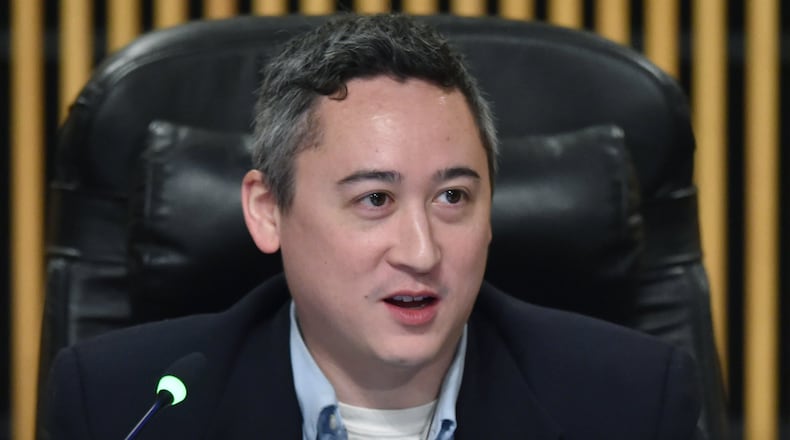As political sea changes go, this has been a pretty smooth one.
In the three-plus months since Ben Ku and Marlene Fosque joined the Gwinnett County Board of Commissioners — making them the commission's first Democrats in more than three decades — the waves haven't been as choppy as some expected. But the duo, who also are the commission's first-ever members of color, have started to make an imprint on the government that represents Georgia's most diverse county.
Things have just been a bit more under the surface so far.
“Having our voices and some different opinions and different ideas at this level, I think is really making a difference,” Ku said. “And that is filtering down to the organization.”
Examples include pushes for an increased social media presence and using less paper, as well as making more diverse appointments to various county boards — and simply bringing a new set of eyes to the table, too.
“I think having people that are new to the government arena on the board sometimes reminds us, it’s almost like seeing Christmas through a child’s eyes,” said Commission Chairman Charlotte Nash, who has been involved with Gwinnett’s government for nearly four decades. “Seeing it through a new commissioner’s eyes refreshes it for us as well.”
Ku and Fosque were elected in November, each unseating a two-term Republican incumbent to become the five-member county commission’s first Democrats since 1986. They took office in January and much of their time since has been spent in training and otherwise getting up to speed on county business.
Much of that business is apolitical: paving streets, fixing traffic lights, providing clean water. The fact that Gwinnett government has been inching toward more liberal approaches to things like homelessness and public transportation have helped reduce tensions created by the new two-party makeup of the commission.
Bigger ideological battles are on the horizon, however, over specific approaches to things like affordable housing, development and the way the government interacts with the international community.But the new commissioners’ most tangible influence thus far has been in their appointments to local boards.
Both Ku and Fosque have made it a point to appoint a diverse array of residents.
“I have Republicans, I have Democrats, I have men, women, I have people that are all different ethnicities,” said Fosque, who campaigned on increasing diversity throughout the county government. She is the commission’s first black member. “But more importantly I was looking for skill sets.”
Same goes for Ku, who said his 14 appointments thus far have included black and Asian residents, members of the LGBTQ community and folks that generally skew younger.
In addition to being Gwinnett’s first commissioner of Asian descent, Ku is the board’s first openly gay member. At 37, he’s also one of the younger members in recent memory. His background as a software developer has brought plenty of digital savviness — and yet another fresh perspective — to the table.
“It ends up being not a lot of really big things,” Ku said, “but more of pushing in a lot of little areas that will overall have a significant impact.”
At the commission’s recent two-day planning retreat in Athens, Nash, known more for her pragmatism than an ideological bent, made a point of commenting on the amount of laughter in the room during discussions. She called it a good sign.
“That’s one of the good things that comes as a result of change on an elected body,” Nash said this week. “You get an infusion of new interests, of energy, and that’s contagious. It adds something positive to the overall situation.”
There is, of course, one big political elephant in the room.
Republican Gwinnett Commissioner Tommy Hunter gained national infamy in 2017 after writing a Facebook post calling civil rights hero and U.S. Rep. John Lewis a "racist pig." Other missives referred to Democrats as "Demonrats" and a "bunch of idiots."
Hunter's Facebook posts triggered months of protests at commission meetings, a public reprimand and a still-pending lawsuit against the county ethics board that recommended his punishment. Local Democratic leaders have credited it all with helping energizing their party and, during their campaigns, Ku and Fosque weren't shy about pointing to Hunter's statements as clear evidence for Gwinnett's government needing more diverse voices.
Hunter and the new commissioners have struck up a cordial working relationship that is “refreshingly civil,” as Ku put it.
They have credited Hunter with helping them learn the ropes. And Hunter said he’s enjoyed having the Democrats around.
“It’s been a lot of fun,” he said. “As long as we don’t let it become personal, we’ll do a great job.”
About the Author
The Latest
Featured





